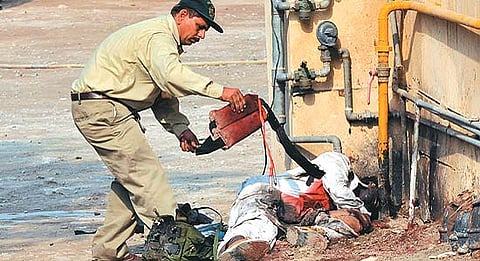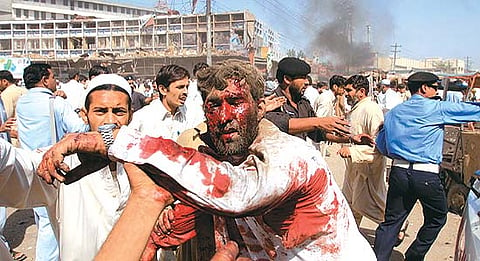Then The Bunker Buster
The GHQ attack shook up the Pak defence organisation. How will the game proceed?
- The army, poised to launch operations in south Waziristan, has become a militant target.
- It now faces the wrath of tanzeems it raised to fight in Afghanistan and Kashmir. Old ties of patronage set to snap.
- In such circumstances, a high-profile offensive in south Waziristan will have to be deftly managed in image terms. Heavy casualties could alienate locals and cause disaffection in ranks.
- The Kerry-Lugar Bill seeks to make the army subservient to the civilian government: it’s the precondition for US financial aid.
- Army chief Kiyani distrusts Zardari, is parleying with rivals.
***
In that 18-hour firefight, much happened—a brigadier fell, five soldiers died, hostages were taken and ultimately rescued in an operation launched in the early hours of October 11. Nine of the 10 terrorists who had stormed GHQ were killed; one, Mohammed Aqeel aka Dr Osman, a former army nurse, was nabbed even as he tried to blow himself up.
However, the siege was in a way symbolic of the challenges the army is buffeted by now. It fought the militants in Swat, and it’s on the verge of sweeping through south Waziristan; but it has itself become the bombing target of Pakistani militants. Gradually, all those years of cultivating militants to engage in low-intensity conflict in Kashmir and Afghanistan are coming back to haunt it. And now the Americans are stepping up the pressure, setting riders for its $1.5 billion in annual assistance to Pakistan (for the next five years) which the generals perceive as an overt bid to curb their untrammelled powers.

But first, the questions and lessons arising from the siege of the GHQ. Why did the army ignore the Punjab CID report predicting an assault on the GHQ by Tehrik-e-Taliban Pakistan (TTP) militants, assisted by Lashkar-e-Jhangvi and Jaish-e-Mohammed cadre, all wearing military uniforms? Second, all the 10 terrorists involved in the GHQ attack were from Punjab, which is clearly a new recruiting ground of the TTP and Al Qaeda. Several media reports had pointed to this trend, but the security establishment insisted the real danger lay in south Waziristan and the jehadis were only using Punjab to lie low.
This reluctance to act against the Punjab-based militants, of course, stems from the army having been their patrons in the past. Over time, though, the TTP has forged links with Punjabi jehadis, harnessing their fighting skills and knowledge of the area to launch devastating attacks. Instead of deploying suicide bombers, as is the wont of militants belonging to the frontier areas, the Punjabi jehadi is willing to engage the army in fidayeen-like attacks a la Kashmir—before the GHQ siege, the militants were involved in shootouts during the attack on the Sri Lankan cricket team and a raid on a police academy in Lahore. Also, Aqeel’s involvement in the GHQ attack has sparked off fears about the number of highly trained, retired soldiers who have sympathies for the Islamists. There have been many reports of such soldiers joining, or training, militant outfits.
Besides fighting militants, the army is simultaneously engaged in a battle of attrition politically. So, even as choppers clattered over the GHQ, Gen Kiyani stepped out of its campus from a side-gate and drove down to the presidential palace for a meeting with President Asif Ali Zardari, PM Yousuf Raza Gilani and isi chief Lt Gen Ahmad Shuja Pasha. Their parleys could not have been smooth—the commandos were even then taking out the militants in GHQ, and the sharp edge of suspicion hung heavily in the air.
The Zardari-Kiyani rift has sharpened to an appreciable degree recently—especially after the Kerry-Lugar Bill (KL), which makes the promised annual US assistance of $1.5 billion subject to certain conditions. The army has said it is “not amused” with the bill, which asks Pakistan to curb those involved in nuclear proliferation activities (providing international monitors access to them), combat terrorist groups (not just Al Qaeda and Taliban, but even outfits like LeT and JeM), and prevent them from operating inside Pakistan or carrying out cross-border attacks in neighbouring countries. Pakistan must also close down terror camps in FATA and elsewhere, including Quetta and Muridke, and take action when provided with intelligence about high-level terrorist targets. Also, the bill demands that the army must not materially and substantially subvert Pakistan’s political or judicial process.
The army took these conditions as a slight, because the bill clearly delineates a role for it that is subservient to the civilian government. So miffed were the generals that Islamabad thought it prudent to rush foreign minister Shah Mehmood Qureshi to Washington in the hope of getting some provisions of the bill quashed. At the time of writing, Washington didn’t seem keen to play ball. Meanwhile, back in Pakistan critics were coming out, saying there’s nothing in the bill that contradicts the Constitution. As one Umer Farooq wrote in a newspaper’s letter to the editor column, “The corps commanders are government employees whose salaries, perks and privileges come from taxes paid by the people of Pakistan. They should not be commenting on what is a policy matter.” Even the foreign office was surprised at the army’s belated expression of fury over the KL Bill. As one official told Outlook, “There were 35 communications from our mission in Washington and all these were communicated to the GHQ, either through files or telephone calls.”

That said, the army’s manufacturing of a negative opinion on the bill—saying it violates the country’s sovereignty—has found some resonance given the prevailing anti-US sentiments. American author David Ignatius, who was in Pakistan recently, observed: “US politicians have become so accustomed to lecturing others, they lose sight of how their words will be read in foreign capitals.” He says at a time when soldiers are being killed, it’s difficult for the GHQ to accept a bill that favours the civilian government over the military. But then, Ignatius adds, “it’s possible too that Pakistani intelligence chiefs are still playing a double game with the terrorists. But that’s hard to square with their actions in recent months—their successful assault on the Taliban in the Swat Valley and their planned offensive in Waziristan”.
Even as the army prepares to move into south Waziristan, Kiyani remains engaged in political manoeuvring. He has had secret meetings with a clutch of politicians opposed to Zardari, who had earlier riled the army with a statement on no-first nuclear strike vis-a-vis India. His decision to allow special treatment to India in the draft of the Afghanistan Transit Trade Agreement also got the isi wondering about the gameplan of the presidency and its representative in Washington, Hussain Haqqani, who has been accused of deliberately not lobbying against the conditions in the KL Bill. Already, there are rumours that he’ll be recalled to Islamabad. The knives are truly out in Pakistan, both in the battlefield and the corridors of power.
Tags